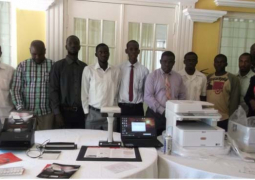The National Population Commission Secretariat (NPCS) recently organised a daylong dissemination workshop for representatives of the media and other partners on the revised National Population Policy.
Speaking at the ceremony held at TANGO, Saikou Trawally, director of population affairs, said the role of a journalist entails a significant obligation and responsibility, the discharge of which requires journalists to have high ethical standards and practise sound professional journalism.
Mr Trawally said the media as a whole is expected to be well focused on development issues, educating and entertaining the public.
Trawally revealed that, as journalists they face stiff challenge to change the sometimes negative perceptions on certain population and development issues. “You must report accurately issues that affect the lives of Gambians and help government in its efforts at ensuring the quality of lives of all Gambians is improved.”
Mr Trawally told journalists to use the power of the media positively to promote the ICPD agenda that seek to ensure countries worldwide attain sustained economic growth in the context of sustainable development education, especially for girls, gender equality and equity, infant, child and maternal mortality reduction, and provision of universal access to reproductive health.
According to Trawally, people in The Gambia must be adequately informed about issues relating to maternal and child health, HIV/AIDS, STIs, gender and the wanton degradation of the environment.
These issues, he said, are both global and national concerns and cannot be dealt with effectively without the inducement of the country’s largely uninformed majority, who also happen to suffer the scourges the most.
According to him, the Gambia government through a consultative process revised the National Population Policy in 2007 to address current population trends and dynamics in relation to sustainable socioeconomic and environmental development.
For her part, Madam Bintou Susso of the UNFPA said the UNFPA has been funding this programme for a long time, noting that the population policy is a document that takes account and provides guide to a country’s programme on reproductive health issues.
Madam Susso described the document as timely as it also shares the information with the media.
Mariam Diarra, assistant representative of the UNFPA, said the UNFPA is an international agency that promotes the rights of every woman, man and child to enjoy a life of health and equal opportunity.
Ms Diarra said the UNFPA supports countries in using population data for policies and programmes to reduce poverty as well as to ensure every pregnancy is wanted, every birth is safe, every young person is free of HIV, and every girl and woman is treated with dignity and respect.



